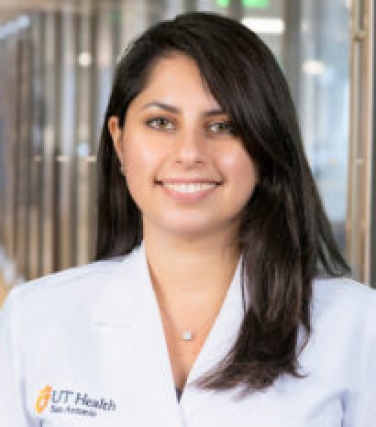
Long fascinated by nature, Claudia Satizabal, PhD, associate professor in the Department of Population Science at The University of Texas Health Science Center at San Antonio (also called UT Health San Antonio) Joe R. and Teresa Lozano Long School of Medicine, aspired to become a geneticist when she was younger. However, such a career did not exist at the time in her home country of Colombia.
Guided by a beloved high school chemistry teacher, Satizabal went on to pursue an undergraduate degree in microbiology. While pursuing her undergraduate degree, she minored in neurobiology and took a class in epidemiology. She enjoyed it so much that she decided to switch gears and pursue a master’s degree in epidemiology in the Netherlands.
“Later, I found a PhD program that combined my two passions —neuroscience and epidemiology — working in an Alzheimer’s disease lab in France,” Satizabal said. “This has been my path since, and I feel fortunate to have the opportunity to dedicate my career to improving brain health in the general population, especially for those who have traditionally been underserved by research.”
Satizabal came to the United States 10 years ago to pursue a post-doctoral fellowship under the mentorship of Sudha Seshadri, MD, then a professor at Boston University School of Medicine and now professor of neurology and founding director of the Glenn Biggs Institute for Alzheimer’s and Neurogenerative Diseases at UT Health San Antonio.
“One year into my role as an assistant professor at Boston University, Dr. Seshadri was called and offered the role of becoming the founding director of a new Alzheimer’s institute in San Antonio,” Satizabal said. “When she asked whether I wanted to be part of that pursuit, I gladly accepted the challenge, as it presented me the opportunity to focus my research on the Hispanic/Latino community, which is close to my heart.”
Satizabal currently leads several projects, including investigating the role of mitochondrial DNA features in Alzheimer’s disease in collaboration with diverse cohorts, finding gut microbiome signatures in Alzheimer’s disease, validating biomarkers for vascular contributions to cognitive impairment and dementia, as well as investigating midlife risk factors contributing to dementia disparities in the San Antonio Heart and Mind Study. She is also the Population Neuroscience Core Leader of the South Texas Alzheimer’s Disease Research Center. The Biggs Institute, in collaboration with The University of Texas Rio Grande Valley, is Texas’ only National Institute on Aging-designated Alzheimer’s Disease Research Center.
“My long-term goal is to advance the health and well-being of populations at increased risk of dementia,” Satizabal said. “In that framework, my work is currently focused on identifying psychosocial, lifestyle, environmental and genomic factors contributing to disparities in abnormal brain aging, vascular cognitive impairment, stroke, Alzheimer’s disease and related dementias. By understanding dementia risk factors’ critical periods of effect, we have a unique opportunity to help prevent or delay the onset of dementia.”

